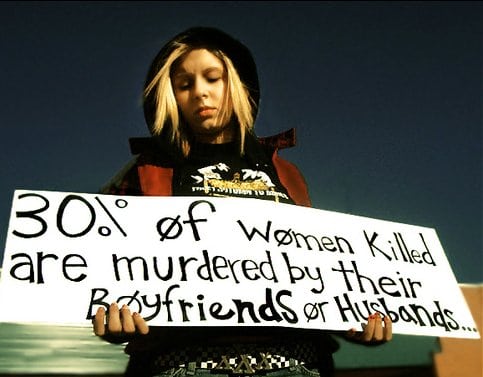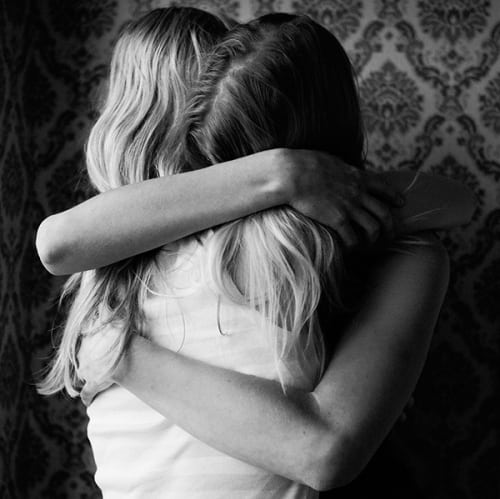You’ve probably heard by now about former NFL and Baltimore Ravens player Ray Rice physically assaulting his fiance (now wife) in an elevator this past February. The first video of the incident, initially released in July, revealed Rice leaving an elevator in the Revel casino hotel in Atlantic City, while DRAGGING his unconscious fiancé out behind him. At that time, Rice was given a slap on the wrist not only legally, but from the NFL as well – a whopping 2 game suspension!
Now, this incident has hit the spotlight again with a release of new footage. The previously released footage was from outside the elevator. Now, footage from inside the elevator has been released.
Before this footage was released, we were aware that he had knocked her unconscious in the elevator. But once people actually saw what happened, all hell broke loose. In the video, we see the couple enter the empty elevator. She appears to slap Rice, and he in return hits her palm open. Then, he then immediately punches her in the face. She falls to the ground as a result of the blow and does not get up.
After this surfaced, the NFL and the Ravens organization did what they should have done in the first place. They cut Ray Rice from his team and the NFL for life. Even this is a relative slap on the wrist. This man should be serving jail time.
Criticism of the Victim
Since this has happened, there’s the criticizing of his wife. Yes, she still married him. She even took to defending him on social media the day after Rice was let go from the NFL. While it’s confusing and upsetting to some that she stayed, we all need to remember that no matter what, this woman is a victim. She loves Ray Rice, and in her eyes, she is defending someone she loves, and believes loves her back.
I can’t say I understand her mentality right now, because I am not in her situation. But I can come to some conclusions based off my own experiences, and the experiences of friends who have been victims of domestic violence. Regardless of how it looks from the outside, there are many reasons why women in domestic abuse situations stay in abusive relationships – even when it seems crazy to the outside world.

1. Mental & Emotional Manipulation
Many of these men are very good at spotting and using weaknesses. They can recognize a perceived flaw in their partner, and then exploit that to both hurt the partner and make them stay simultaneously. It could be fears rooted in childhood – such as being afraid of a partner leaving because of a divorced family. Or it could be a perceived flaw, like body image issues or perceived worthlessness. It could even be a more general human fear, as the thought of being unlovable, alone, or unwanted in the future. An abusive partner will see this, and use it to their advantage.
In my case, my partner knew that I had a past of being used by men, and then being left for someone who they thought was better. I was afraid of not being good enough for my partner, and wanted to ensure I was the best I could be. My boyfriend used this fear to his advantage. If I tried to break up with him, he would throw it in my face. He would tell me that no one was actually going to love me in the future, I was just a piece of ass that no guy will actually want to keep around, trash, not good enough for anyone. I was lucky to have him love me, because no one else would.
After hearing it so much, I believed him. Its been years, but there are still some days that I think he was right. That’s how deep they can get into your head.
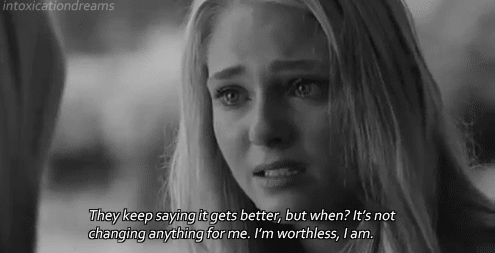
There’s also usually the tactic of reverse psychology. The abuser will often make the woman feel like the abuse is her fault; that she does something to cause his violence towards her. Whether it’s doing something wrong around the house, talking back a certain way, or simply not living up to his standards – any little thing can be used to keep the victim in their place.
In my case, I dressed “slutty” to get other guys’ attention. If I hadn’t “flaunted” my body and made him so jealous, he wouldn’t have gotten so angry with me. Instead of sticking up for myself, I started wearing sweatshirts, looser fitting clothes, and nothing low cut that would draw attention to myself. I thought I could fix it by being “better. I thought that if I could just behave the way he wanted, and he’d stop. I was wrong.
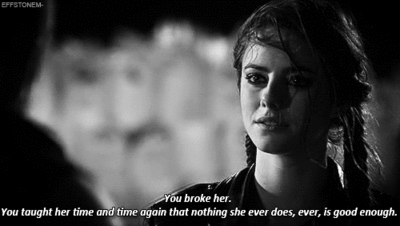
2. They are Always Sorry
Once the abuser gets inside the victim’s head, they can convince her that this warped and twisted relationship is really about love. Despite everything that has gone on – he still loves her, and he is truly, deeply sorry. Saying “sorry” mixed with “I love you” in different ways becomes enough. Think of it as two people in a healthy relationship. They get into a disagreement one night, raise their voices, and argue. Then the next day he says he is sorry, lays the love on thick, and maybe sends flowers or buys her a gift to apologize. She accepts it, and they continue on together.
It’s kind of like that. To him, his anger and abuse is like a small disagreement. He may say that this is how all couples fight, or that he is working on his temper. He may apologize, be overly sweet, buy gifts. Hell, one of my friends dated a guy that helped her clean up the mess he made from beating her. He went as far as to clean and care for the cuts he left on her face during his rage. Anyway, the abuser makes it seem like this all is normal, and that he deeply regrets his actions, wants to care for her, and will never do it again.
If she mentions leaving, depending on his mood, the waterworks and love professing starts.
- I’m so sorry baby, I’ll never hurt you again. I swear.
- I just love you so much. I’m afraid of losing you.
- I would rather die than hurt you again.
- Please don’t leave me, I’ll get help.
Sure, this may sound cliche at this point, but he knows that she cares about him – and she wants to hear it. But, this is just another form of manipulation to try to get the victim to stay.
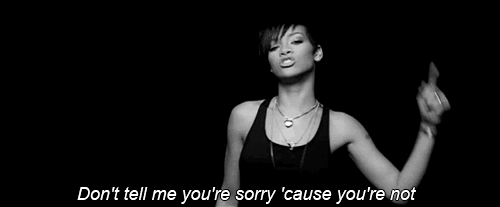
3. Isolation
‘Well, where are her friends and family? Why wouldn’t they help her, or get her away from him?!’
In many cases, by the time the victim realizes she needs to get out, she has been completely isolated from her friends and family. She may feel too embarrassed to admit what’s going on to anyone. Not only does she believe that it’s her fault, but she believes that everyone else will blame her and that no one will care to help her. There is a stigma associated with abuse victims, especially those who have been in the relationship for a long time. She is afraid that people will think she is stupid or weak. If she didn’t leave after the first time, then she is just asking for it by now.
She may also feel that her abuser may attack her if she leaves, either physically or socially. They may have mutual connections and friends that he can also manipulate. He may seem like a really good guy to everyone else, someone who would never be capable of that kind of thing, and she is afraid that no one will believe her. She is afraid to reach out and afraid of the consequences. She may think that no one will be there to help her.
If other people point out what is going on, and show that they are there for the victim, it is still not easy. He may have convinced her that others are jealous of what they have, no one wants to see them happy, or that other people are just telling her things to try to break their love apart. He has likely convinced her that this is normal and that it’s everyone else who is the problem. She may feel like it’s him and her against the world. Even when he is hurting her, he has made her believe that he is the only one she can truly trust and rely on.
Sometimes victims get defensive when their abuse is pointed out by someone else, and they may start shutting that person out. The best thing to do is not turn your back. Don’t think, “Well if she doesn’t want my help, I’m done.” No. If you’re a true friend, you’ll stay there as support the entire time – and when they need you the most. Don’t push the matter, but let them know you’re there for them if they ever need anything. Let her know that you don’t think this is good for her at all and that you will be there when she decides to leave. Let her know that hopefully before it is too late, the day will come where she will leave. Offer to go with her to meet him in a public place, stay with her every night, and be there for her for whatever happens next.
After he has broken her down mentally, emotionally, and physically, she is going to need strong support. Having that support open and waiting for her may help her make that decision to leave sooner.
Never judge a victim, and definitely do not ask why they wouldn’t “just leave”. Abuse victims already feel terrible beyond what’s imaginable. They don’t need to feel any more embarrassed and broken down than they already do. Don’t blame them or be another bully in their life.

To the Abused,
This is not what love is. Love is not hiding bruises and cuts under layers and layers of make-up and clothes. Love is not feeling like a prisoner. Love is not feeling like constantly suffocating, constantly feeling like you’re drowning. Love is not a fist to your face or a kick to your ribs. Love is not fearing for your life every day, thinking maybe this is the day that he finally kills you.
He may try to convince you that what he feels for you is love and that he does it to you because he loves you so much. It’s not true. He doesn’t feel love when he is hitting you. He feels power. He feels in control. He does not love you. He loves the power he has taken away from you. Even though he says he will stop, he won’t. He is greedy and addicted to the feeling he gets from knocking you down.
You may feel alone, embarrassed, and ashamed that you got yourself into this. But you didn’t get yourself into it. You are not to blame, at all. It doesn’t matter how long you have been with him, or how long you stayed after the abuse started. It’s not your fault. If you think back and there was someone who tried to reach out to you, who you may have gotten upset with at the time, reach out again. You may not have spoken with them for a while, but trust me, from experience, they still want to help you. No judgment.
If you feel like you don’t have anyone to help you, there are so many options. Many churches, clinics, human service offices, and organization will help you find a safe place to go if you just ask for help. We have included some resources at the bottom for you.
Just remember, the only way the abuse is going to stop is if you leave, or he finally ends up killing you.
#WhyIStayed
In wake of this unfortunate situation and her defense of Rice, many have asked; ‘Why is she still with him?!’ Sparking a trending topic blowing up Twitter as we speak. #WhyIStayed, to give others who have been through it, a glimpse into why some stay even after they are brutalized by the person they love. So here is mine.
#WhyIStayed: He made me believe I was worthless and alone.
#WhyILeft: I decided I didn’t want to be another statistic. I didn’t want to die.
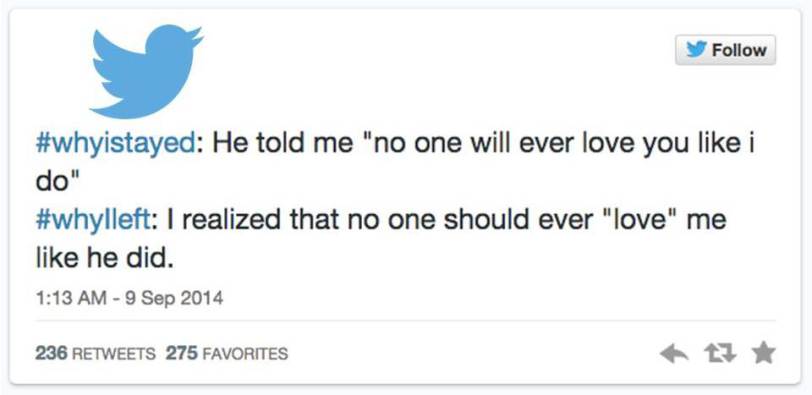
Resources
If you’re suffering from domestic abuse you’re not alone. If you have a friend who is suffering, reach out. There are resources out there to help you.
Love is Respect
The ultimate resource for healthy relationships. Promotes and provides resources on healthy dating, communicating with your partner, conflict resolution, abusive relationships, and the different types of abuse. Provides support options and resources including safety planning, strategies to reach out, and legal help.
Love is Respect: National Dating Abuse Helpline
1-866-331-9474 Available 27/7 | 1-866-331-8453 TTY
Designed for teens and young adults who are involved in abusive relationships. Trained peer advocates offer real-time one-on-one support including information, resources, and advocacy.
Break the Cycle
Dedicated to the prevention of dating abuse. Engages, educates, and empowers youth to build lives and communities free from domestic and dating violence. Teaches about the warning signs of abuse, building healthy relationships, safety planning, and legal services.
National Domestic Violence Hotline
1-800-799-SAFE (7233) Available 24/7 | 1-800-787-3224 TTY
Provides crisis intervention, safety planning, information, resources, and referrals to agencies nationwide.
